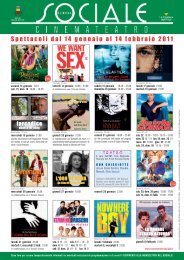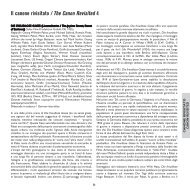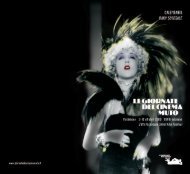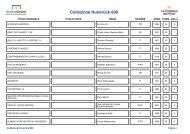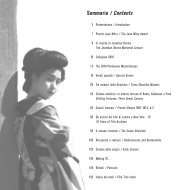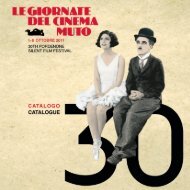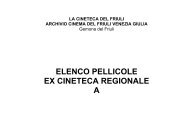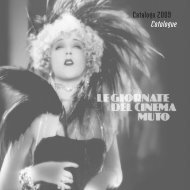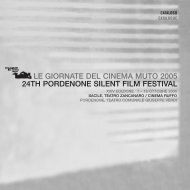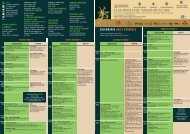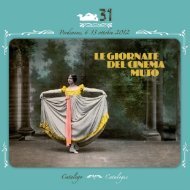Le Giornate del Cinema Muto 2006 Sommario / Contents
Le Giornate del Cinema Muto 2006 Sommario / Contents
Le Giornate del Cinema Muto 2006 Sommario / Contents
You also want an ePaper? Increase the reach of your titles
YUMPU automatically turns print PDFs into web optimized ePapers that Google loves.
In ricordo di Jonathan Dennis / The Jonathan Dennis Memorial <strong>Le</strong>cture<br />
Per ricordare Jonathan Dennis (1953-2002), che ha fondato e diretto per anni il New Zealand Film Archive, le <strong>Giornate</strong> organizzano ogni anno ogni<br />
anno una conferenza in suo nome, chiamanando a parlare personalità il cui lavoro contribuisce allo studio e alla valorizzazione <strong>del</strong> cinema muto.<br />
Jonathan Dennis era un archivista esemplare, un paladino <strong>del</strong>la cultura <strong>del</strong> suo paese, la Nuova Zelanda – con una profonda consapevolezza <strong>del</strong><br />
ruolo <strong>del</strong> popolo indigeno dei Maori, e soprattutto era una persona di eccezionali dote umane.<br />
In 2002 the <strong>Giornate</strong> <strong>del</strong> <strong>Cinema</strong> <strong>Muto</strong> inaugurated this annual lecture in commemoration of Jonathan Dennis (1953-2002), founding director of the<br />
New Zealand Film Archive. Jonathan Dennis was an exemplary archivist, a champion of his country’s culture – particularly of Maori, the indigenous<br />
people of New Zealand – and above all a person of outstanding human qualities.<br />
The lecturers are selected as people who are pre-eminent in some field of work associated with the conservation or appreciation of silent cinema.<br />
THE JONATHAN DENNIS MEMORIAL LECTURE <strong>2006</strong><br />
Michael Eaton: “Il tempo ed il silenzio” / “Time and Silence”<br />
Michael Eaton, MBE (Membro <strong>del</strong>l’Ordine <strong>del</strong>l’Impero Britannico), è uno sceneggiatore noto – e premiato – per il suo lavoro nel campo <strong>del</strong><br />
“factual drama”. Nella sua città natale, Nottingham, collbora anche all’annuale British Silent Film Festival. Recentemente ha curato il doppio<br />
DVD <strong>del</strong> BFI Dickens Before Sound, le cui musiche sono composte dal suo buon amico Neil Brand, con il quale viene spesso scambiato per via<br />
<strong>del</strong>la corporatura.<br />
“Avendo già adattato Dickens per un mezzo privo di immagini quale la radio ed avendo anche da poco curato una raccolta di film tratti da opere<br />
di Dickens agli inizi <strong>del</strong> cinema, mi piacerebbe davvero capire quanta influenza la prosa <strong>del</strong>l’Inimitabile abbia effettivamente esercitato sullo<br />
sviluppo <strong>del</strong>la narrazione cinematografica. Come drammaturgo, sento anche il bisogno di scoprire con esattezza quale fosse il ruolo <strong>del</strong>lo scrittore<br />
in un mezzo privo di parole. Il titolo che ho scelto è una citazione da Eliot Stannard, uno degli autori britannici più influenti dal 1914 alla fine <strong>del</strong><br />
muto. I suoi 150 copioni comprendono 8 dei film muti di Hitchcock. Il Tempo ed il Silenzio, ha scritto, sono ‘per noi i due maggiori ostacoli’.”<br />
MICHAEL EATON<br />
Michael Eaton, MBE, is an award-winning British screenwriter known for his work in the “factual drama” genre. He is also involved with the<br />
annual British Silent Film Festival in his hometown of Nottingham. He recently compiled and edited the BFI’s Dickens Before Sound DVD<br />
collection, in collaboration with his good friend Neil Brand, for whom, on account of physique, he is frequently mistaken.<br />
“Having been an adapter of Dickens for a medium without pictures – the radio – and having also recently compiled a collection of films adapted<br />
from the works of Dickens in the early years of cinema, I would really like to understand just how influential the Inimitable’s prose style actually<br />
was on the development of cinematic story-telling. And, as a dramatist, I also feel the need to discover exactly what the role of the writer was in<br />
a medium without words. My title is a quotation from Eliot Stannard, one of the most influential British writers from 1914 to the end of the silent<br />
period. His 150 scripts include 8 of Hitchcock’s silent films. Time and Silence, he wrote, are ‘our two greatest obstacles’.”– MICHAEL EATON<br />
Precedenti relatori / Previous <strong>Le</strong>cturers: Neil Brand (2002), Richard Williams (2003), Peter Lord (2004), Donald Richie (2005)<br />
9



